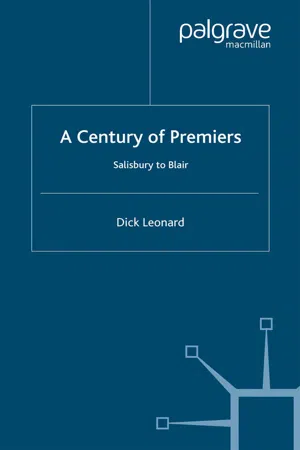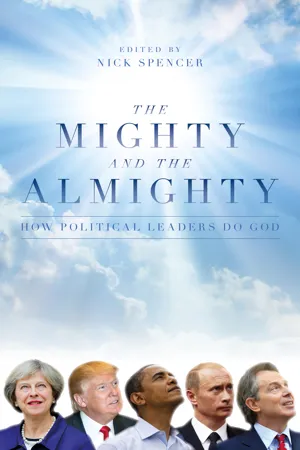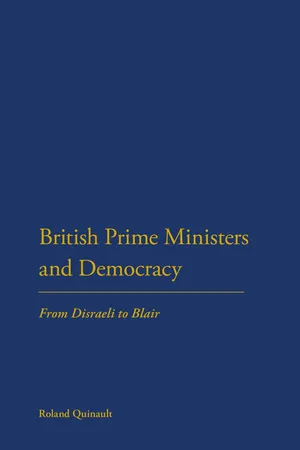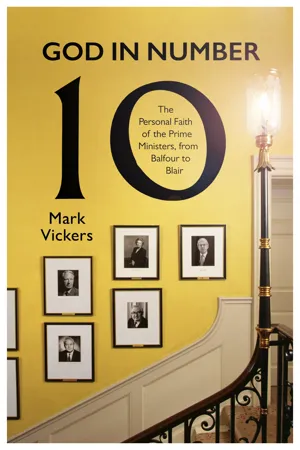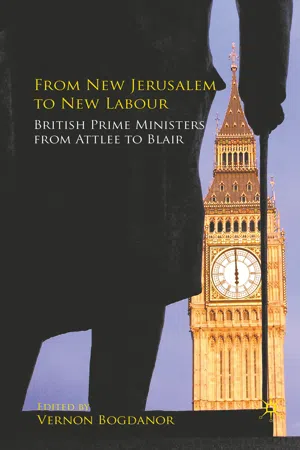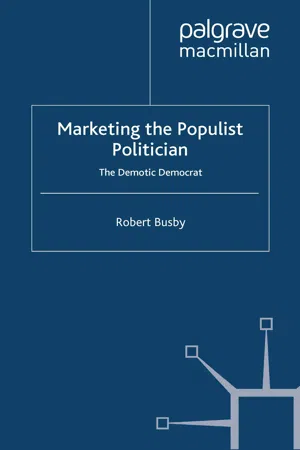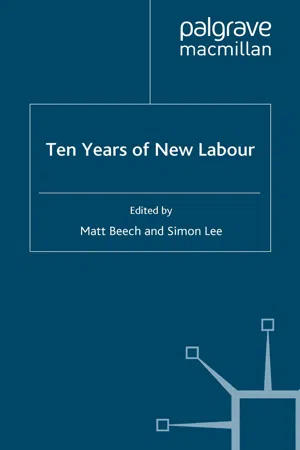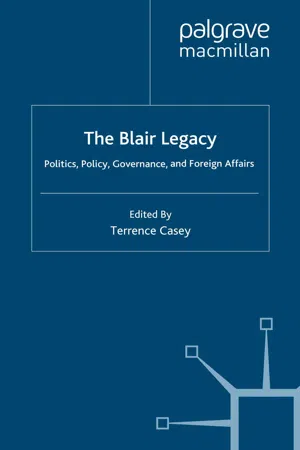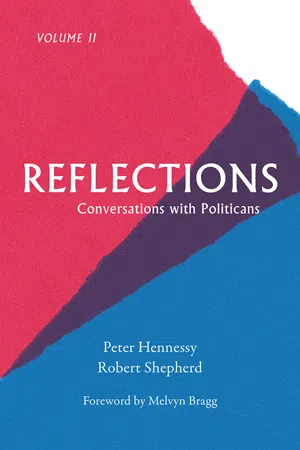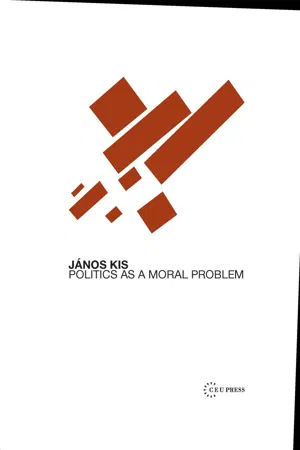History
Tony Blair
Tony Blair served as the Prime Minister of the United Kingdom from 1997 to 2007, representing the Labour Party. He is known for his modernizing agenda and for leading the party to a landslide victory in 1997, ending 18 years of Conservative rule. Blair's tenure was marked by his role in the Iraq War and his efforts to promote social and economic reforms.
Written by Perlego with AI-assistance
Related key terms
1 of 5
10 Key excerpts on "Tony Blair"
- eBook - PDF
A Century of Premiers
Salisbury to Blair
- D. Leonard(Author)
- 2015(Publication Date)
- Palgrave Macmillan(Publisher)
If, on the other hand, it falls into chaos or another tyrant seizes power, he could be con- demned as a misguided, if well-intentioned, meddler; an Icarus who flew too close to the sun and burnt his wings. His career still continues, and may do so for several more years, but it may not yet be too early to draw some conclusions, or to start measuring him against his predecessors. This apparently naive ‘outsider’ has proved to be a redoubtable political operator who has dominated British politics for a decade or more. He has transformed his party – largely against the wishes of many of its activists. In policy terms, he has shown himself to be a ‘revisionist’, in the tradition of Tony Crosland, though with less intellectual rigour, and has turned Labour into a formidable vote-winning machine, extending its electoral appeal far beyond its traditional boundaries, an achieve- ment at least comparable to the earlier feats of Lord Salisbury, the young Ramsay MacDonald and Margaret Thatcher. The changes he effected to the country, though less dramatic, may prove equally profound, particu- larly in the constitutional field, though the economic and social reforms A Century of Premiers 366 for which his governments have been responsible are far from being negligible. The last Prime Minister of the twentieth century and the first of the twenty-first, Tony Blair may not, ultimately, be seen as a great premier, but certainly as one who, to use a phrase first applied to Joe Chamberlain by Winston Churchill, was, in his time, largely responsible for forming the political weather. Works consulted Abse, Leo, Tony Blair: The Man Who Lost His Smile, London, Robson Books, 2003. Butler, David, and Dennis Kavanagh, The British General Election of 1997, Basingstoke, Macmillan (now Palgrave Macmillan), 1997. Butler, David, and Dennis Kavanagh, The British General Election of 2001, Basingstoke, Macmillan (now Palgrave Macmillan), 2002. Cohen, Nick, Pretty Straight Guys, London, Faber, 2003. - eBook - ePub
The Mighty And The Almighty
How Political Leaders Do God
- Nick Spencer(Author)
- 2017(Publication Date)
- Biteback Publishing(Publisher)
Tony Blair (1997 – 2007) ANDREW CONNELLINTRODUCTION
T ony Blair became leader of the British Labour Party in 1994, and served as Prime Minister of the United Kingdom from 1997 to 2007. He won three successive general elections and became the longest-serving Labour Prime Minister in British history. However, for nearly a decade after 2007 his reputation lay very low, tainted by accusations of authoritarianism and of an excessive fondness for neo-liberalism, and by a long and messy war following his decision to join the American invasion of Iraq in 2003. The purpose of this chapter is not to attempt to confirm or reappraise that reputation, but to explore the relationship of Blair’s Christian faith to his politics at home and abroad.In the public mind, Blair was probably more closely associated with Christianity than any Prime Minister since Gladstone. It was easy for cartoonists and satirists to draw on this association: every fortnight for ten years, he was lampooned in the satirical magazine Private Eye as the embarrassingly earnest and enthusiastic ‘Vicar of St Albion’s’. In one way this is strange and perhaps unfair, not only because Blair’s faith placed him among the great majority of post-war British Prime Ministers,1 but because for most of his political career he played down his religious beliefs. He did not hide them but with very few exceptions he did little to draw attention to them.This was a conscious decision which was, once Blair became leader of the opposition and then Prime Minister, strongly reinforced by the guidance of his press secretary, Alastair Campbell. Campbell firmly believed that British politicians who referred overtly to their personal faith were laying themselves open to wilful misrepresentation, and charges of sanctimony, from their opponents. When, at Easter 1996, Blair gave an extended interview about his faith to the Sunday Telegraph newspaper (see below), Campbell was furious: hostile commentators accused Blair of using religion for political ends and of trying to co-opt God for the Labour Party. Blair accepted Campbell’s verdict and for many years afterwards very seldom discussed his faith directly in public.2 As he would say in a speech delivered the year after his resignation, in Britain a politician’s admission of his or her faith opened up a range of unhelpful suppositions – that he or she was ‘weird’ and prone to make decisions on a basis of ‘the promptings of an inscrutable deity’ rather than reason, was seeking to impose faith on others, was pretending to be better than other people, and was seeking to ‘bestow a divine legitimacy’ on his or her politics.3 He did from time to time, as for example in his Millennium Speech in 1999, talk about the value of religion in more general terms,4 but even these references could be suspect. For example, in 2000 he accepted an invitation to deliver a speech at Tübingen University in the presence of the distinguished Catholic theologian Hans Küng: Campbell recorded in his diary his concern that the speech would be seen as ‘eccentric’ and noted that ‘on the plane [to Germany] we worked on the speech and I was trying to get the religion out and more politics in’.5 At the beginning of the Iraq War, when Blair wanted to end a television address with the words ‘God bless you’, he gave way to the protests of his advisors and instead concluded with a simple ‘thank you’.6 - eBook - PDF
British Prime Ministers and Democracy
From Disraeli to Blair
- Roland Quinault(Author)
- 2011(Publication Date)
- Continuum(Publisher)
198 199 10 Tony Blair We are a democracy, strong enough to have doubts raised even at a time of war and wise enough to be able respond to them. – Tony Blair, 2001 1 Over these eight years we have won the battle of values. The age we live in is democratic not deferential. – Tony Blair, 2005 2 Tony Blair was, in many respects, a master of democratic politics. He has been described as an exceptionally gifted politician – the most natural persuader of all the Prime Ministers since the introduction of universal suffrage. 3 He was certainly the most successful Labour Prime Minister in terms of the rapidity of his rise, length of time in office and electoral record. Only 11 years after first becoming an MP, he was elected Leader of the Labour Party in July 1994. He realized that if Labour was to return to government – the party had been out of power since 1979 – it needed to adopt a more centrist and populist stance. Thus was born ‘New Labour’ – a rebranding of the party along explicitly social democratic lines, which was designed to increase the party’s popularity, particularly with ‘middle England’. 4 That policy helped Labour win the 1997 general election and Blair became Prime Minister at the age of 43 – the youngest person to hold that office since Lord Liverpool in 1812. His first government enacted more constitutional reforms than any British government in modern times. 5 He went on to win two more successive general elections before resigning after ten years as Prime Minister. Throughout that decade Blair dominated British politics, displaying enormous energy and resilience combined with great skill in communication and persuasion. He did so, moreover, by presenting himself as an ordinary family man – a ‘regular guy’ – who epitomized a new democratic era. Both before and during his premiership, Blair frequently proclaimed the need for more democracy both at home and abroad. Yet his commitment to democracy lacked any obvious theoretical or intellectual roots. - eBook - ePub
God In Number 10
The Personal Faith of the Prime Ministers, Balfour to Blair
- Mark Vickers(Author)
- 2022(Publication Date)
- SPCK Publishing(Publisher)
Tony Blair (1997–2007)
‘Jesus was a moderniser’ Anthony Charles Lynton Blair was born in Edinburgh on 6 May 1953. He was educated at Fettes College, Edinburgh, and St John’s College, Oxford. Having graduated in law, he practised at the Bar. Blair fought the 1982 Beaconsfield by-election as the Labour candidate. In 1983 he was elected for Sedgefield, County Durham, a seat he held until his resignation in 2007.Blair was a modernizer, recognizing that Labour’s chances of re-election required significant changes in policy and presentation. Appointed to the Shadow Treasury team in 1984, he proved himself articulate, capable and a good media performer. He joined the Shadow Trade and Industry team in 1987, was appointed Shadow Energy Secretary in 1988 and Shadow Employment Secretary the following year. Shadow Home Secretary from 1992, his message, ‘Tough on crime, tough on the causes of crime’, resonated with the public.Following John Smith’s early death, Blair was elected Labour Party leader on 21 July 1994. He persuaded the party to amend its constitutional commitment to public ownership of the means of production. Under Blair, ‘New Labour’ ruled out a return to high taxation and nationalization. He appealed to the electorate’s legitimate aspirations for self-improvement while promising compassion for the poorest and those in need. He successfully wooed the City and the media. In contrast to the youthful Blair, Major’s Conservatives appeared tired, divided and immersed in sleaze. Labour won a landslide victory with a majority of 179 in the general election on 1 May 1997. The following day, Blair was appointed Prime Minister.The Chancellor, Gordon Brown, made a commitment to fiscal prudence and gave the Bank of England independence from the government. Blair had to manage the crisis that threatened the monarchy on the death of Diana, Princess of Wales, and was felt to have captured the mood of the nation. His enthusiasm for constitutional reform might have been limited, but the consequences were significant: devolved assemblies for Scotland and Wales, an elected mayor and assembly for London. Foxhunting was outlawed and (most) hereditary peers were removed from the House of Lords. - eBook - PDF
From New Jerusalem to New Labour
British Prime Ministers from Attlee to Blair
- V. Bogdanor(Author)
- 2016(Publication Date)
- Palgrave Macmillan(Publisher)
Tony Blair and New Labour Tony Blair is irrevocably associated with New Labour – sometimes seen as a series of empty formulae, an invention of the spin doctors. In my view such a perception is quite wrong. New Labour won power and held it for three terms precisely because it was based upon an informed analysis of the state of the Tony Blair, 1997–2007 185 world and derived a concrete policy programme from it. Three sets of changes were involved. The first was the impact of globalisation. I believe that I was one of the first to make extensive use of the concept, in the early 1980s. Even some 15 years later, when the notion had become established in the academic literature, it was very difficult to get politicians to take the idea seriously, as I can attest from personal experience of trying. Blair was one who did, and who also came quickly to see the complex nature of the phenomenon. Globalisation means increasing world economic interdependence, but stretches well beyond this, having profound social, cultural and geopolitical consequences. On an eco- nomic level it meant that traditional Labour – old Labour – could no longer be effective. Old Labour was based on Keynesian demand management and control of the national economy. Even revisionist thinkers such as Anthony Crosland, in his classic text The Future of Socialism, published in 1956, had assumed that ‘social democrats could pursue policies of their choice largely untrammeled by foreign opinion’. Perhaps this made sense in the 1950s when the British economy was sheltered by tariffs and exchange controls. It made little sense in the 1990s, by which time ‘it had become clear that social democ- racy in one country was no longer a feasible option’. 1 There cannot, as François Mitterrand found out in 1982, be Keynesian demand management in a glo- balised economy. - eBook - PDF
Marketing the Populist Politician
The Demotic Democrat
- R. Busby(Author)
- 2009(Publication Date)
- Palgrave Macmillan(Publisher)
5 New Labour and Tony Blair 113 The emergence of Tony Blair and New Labour was an event in British politics which would shape the bedrock of the political establishment for more than a decade. Blair’s control of the political agenda, decisive election victories and, overtly at least, control of his party and polit- ical apparatus was important in conditioning the evolution not only of his own party but also that of his opponents, the Liberal Democrats and the Conservative party. There were several areas of note regarding wealth, identity and marketing in British politics which are relevant to the issues addressed by this text. Blair was from a wealthy back- ground and enjoyed a lifestyle and education removed from that of the mainstream populace. As already discussed in Chapter 3 he faced an opponent in 1997, in the shape of John Major, who could realistically claim to come from a background with which many in the electorate could associate. However, Blair could rely upon widespread dissatisfac- tion with the Conservative party as a whole. There were a number of unpopular aspects of the party with respect to its economic profile and perceptions that it was immoral and sleaze ridden. On the face of it, the strength of Blair as a leading political candidate in the run-up to the 1997 election was not based on a direct comparison between the two leaders or a mere personality contest. It was largely an election where the prevalent impression was that a discredited political agenda and a faltering party could and should be removed in favour of a leader and party which had undergone a modern reinvention to cater to voter needs in the 1990s. Needless to say the position of the party leader and how he conveyed himself was a fundamental aspect of how Blair’s New Labour would be received, and how he, as an individual, would be considered across time by the voter. Blair was untypical of the traditional Labour party - eBook - PDF
- M. Beech, S. Lee(Authors)
- 2015(Publication Date)
- Palgrave Macmillan(Publisher)
6 Tony Blair and the Office of Prime Minister Philip Norton When Tony Blair stepped down as Prime Minister in June 2007 he was the ninth longest-serving holder of the office since the time of Sir Robert Walpole. One survey of political scientists and historians in 2004 rated him as the sixth most successful of twentieth-century Prime Ministers (Theakston and Gill, 2006: 198). However, the pattern was not uniform. Historians rated him less highly than political scientists. Much depends on the criteria employed. Peter Riddell, in his book The Unfulfilled Prime Minister, identified ten tests for being a successful Prime Minister (Riddell, 2005: 9–13). Tony Blair, he argued, met over half the tests, but failed some critical ones. According to Riddell, Blair was reluctant to take risks in domestic policy and appeared to many to lack a sense of direction (Riddell, 2005: 14–15). I share Riddell’s views about ends. One of the areas in which the Blair government achieved substantial change was that of the constitution of the United Kingdom, yet it is an area in which there was no clear and coherent direction, no clear stipulated goal. That is a point I have developed elsewhere and has a relevance to what I shall argue (Norton, 2007a: 269–81; Norton, 2007b). My concern in this chapter is not with ends but rather with means; my focus is not policy but rather the institutional means of achieving policy goals. In the case of Tony Blair, how did he use the office of Prime Minister and – as institutions are not neutral in their effect – what have been the consequences for the British political system? 89 90 Ten Years of New Labour Given that the title of my chapter is ‘Tony Blair and the Office of Prime Minister’, I propose to address each part individually before explaining the relationship and the consequences for British government. Tony Blair In institutional terms, Tony Blair was arguably the first truly rootless Prime Minister. - eBook - PDF
The Blair Legacy
Politics, Policy, Governance, and Foreign Affairs
- T. Casey(Author)
- 2009(Publication Date)
- Palgrave Macmillan(Publisher)
But dominant prime ministers, like Blair, can stretch and shape the institutional capacity at their disposal. Techniques of leadership are now well established and essential for modern successful elec- tion campaigns and media strategies which aim to maximise the benefits of incumbency. Personal and institutional political capital, painstakingly acquired over time, can however quickly disappear. Blair stretched the capacity of the prime minister’s office further than any other previous incumbent and cre- ated a premiership based on his individual charisma and personalised appeal (in common with Margaret Thatcher, he did not talk about what ‘we’ the party might do but about what ‘I’ Tony Blair would do (Finlayson, 2002)). But his autonomy bred a sense of dislocation. Greater institutional con- straints enveloped the prime minister in his third term. Some core elements of the command and control nature of the premiership were questioned. 176 Tony Blair as Prime Minister ‘A perceived mismatch between rhetoric and substance in policy achieve- ment, and divisions over Iraq produced a haemorrhaging of trust’ (Theakston, 2007, p. 232). Communications strategy, particularly the cor- rosive impact of ‘spin’ in the Campbell era, came under scrutiny, while prime ministerial patronage and party funding also cast a shadow over Blair’s last months as prime minister. Blair’s successor, as a consequence, inherited greater levels of scrutiny and constraints over powers of patron- age in particular, accompanied by calls for a return to greater cabinet col- legiality. In British politics a prime minister’s power is crucially contingent on tol- erance by the party, as Bob MacKenzie famously pointed out. - eBook - ePub
Reflections
Conversations with Politicians Volume II
- Peter Hennessy, Robert Shepherd(Authors)
- 2019(Publication Date)
- Haus Publishing(Publisher)
Tony BlairSeries 5, Episode 1, first broadcast 10 August 2017Born 6 May 1953; Educated Fettes College; St John’s College, Oxford; Lincoln’s InnMP (Labour) Sedgefield 1983–2007 Leader of the Labour Party, 1994–2007; Leader of the Opposition, 1994–97; First Lord of the Treasury and Prime Minister, 1997–2007Autobiography A Journey, 2010HENNESSY
With me today is Tony Blair, a bedazzling politician who as Prime Minister for ten years with his energetic policies at home and abroad gave his name to an era. Like other Prime Ministers whose personality creates an aura and whose name acquires an ‘ism’, few people are neutral about him and his legacy, especially the Iraq War and its aftermath. Historians will linger long over the Blair years in Number 10 between 1997 and 2007, his policies, his style of government and his attempts to remake the centre-left of British politics almost from the moment he succeeded John Smith as leader of the Opposition in 1994. We’re meeting in the Tony Blair Institute for Global Change in central London.Tony, you were born in 1953 in Edinburgh. Tell me about your family.BLAIR
My family was unusual in the sense my father was a foster child, who was brought up in a very poor part of Glasgow. In the 1930s he became Secretary of the Young Communists. He was virtually the only person I’ve ever come across who went off to serve in the war as a confirmed socialist and came out the other end as a Conservative in 1945. [Laughs]HENNESSY
Unheard of.BLAIR
Right, so. And my mother was from Irish stock, from Protestant southern Irish stock. So it was – they were both, although not originally from Scotland, brought up in Glasgow. That’s where they met, that’s where they married. And you know, my father was a fascinating man, a very brilliant man who would have been, I think, a very successful Conservative politician. He was due to stand for Parliament in the 1964 election, for what was a relatively safe Conservative seat and then tragically had a stroke at the age of 40 which finished his political career. - eBook - PDF
- János Kis(Author)
- 2008(Publication Date)
- Central European University Press(Publisher)
See Butler Report, 81, 82– 86. 29 A. Grice: “The Legacy: Tony Blair Prime Minister 1997–2007.” In The In-dependent , May 11, 2007. 30 “A Vote of Confidence.” In The Economist , April 9, 2005. 31 For Manning’s statement, see A. Rawnsley: “Iraq Is Not Just Blair’s Dark Legacy: It Defines the Future.” In The Observer, June 17, 2007. 32 See the Kosovo Report by the Independent International Commission on Kosovo. Oxford: The University Press, 2000. 33 One condition failed to obtain fully. It is not clear that the peaceful means to prevent ethnic cleansing were exhausted by the time the war started. Shortly before that date, negotiations were held in Paris between the representatives of the DIRTY HANDS IN POLITICS 233 Yugoslav government and of the international task force that was supposed to deal with the Kosovo crisis. At the Paris talks, the Yugoslav delegation was given an ultimatum including harsh conditions that they could be expected to reject (to allow NATO troops to occupy positions within Serbia in order to secure access to Kosovo, among others). Defenders of the Yugoslav position cite this as evidence that the Western powers sought the talks as a pretext to go to war, rather than as an opportunity to avoid war. On the other hand, as the Paris talks started, the military preparations for ethnic cleansing in Kosovo were completed, and the first steps towards expelling the Kosovar Albanians had been taken. 34 He has never publicly recognized that he had taken Britain into an unlaw-ful war. On March 7, 2003, his Attorney General submitted a legal opinion in which he voiced some doubts as to the legality of the invasion. Blair did not let even members of his cabinet read the document. See C. Short: “How Ministers Were Misled on the Legality of Iraq Invasion,” in The Independent, May 5, 2005. In Lord Goldsmith’s speech before the House of Commons on March 17, there was no reference to his doubts.
Index pages curate the most relevant extracts from our library of academic textbooks. They’ve been created using an in-house natural language model (NLM), each adding context and meaning to key research topics.
